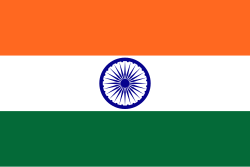| National Human Rights Commission राष्ट्रीय मानव अधिकार आयोग | |
|---|---|
 | |
 Official Flag of India | |
| Motto | Sarve Bhavantu Sukhinaḥ (transl. "May All be Happy") |
| Agency overview | |
| Formed | 12 October 1993 |
| Annual budget | ₹ 7,553 crore (US$890 million) (in 2024–2025 budget) |
| Jurisdictional structure | |
| Federal agency (Operations jurisdiction) | India |
| Operations jurisdiction | India |
 | |
| Map of National Human Rights Commission's jurisdiction | |
| Size | 3,287,263 km2 (1,269,219 sq mi) |
| Population | 1,428,627,663 (estimate 2023) |
| Legal jurisdiction | India |
| Governing body | Ministry of Home Affairs (India) |
| Constituting instrument |
|
| General nature | |
| Operational structure | |
| Headquarters | Manav Adhikar Bhavan, Block-C, GPO Complex, INA, New Delhi - 110 023. |
| Ministers responsible |
|
| Agency executives |
|
| Child agencies |
|
| Notables | |
| Anniversary |
|
| Website | |
| www | |
The National Human Rights Commission of India (abbreviated as NHRC) is a statutory body constituted on 12 October 1993 under the Protection of Human Rights Ordinance of 28 September 1993. [1] It was given a statutory basis by the Protection of Human Rights Act, 1993 (PHRA). [2] The NHRC is responsible for the protection and promotion of human rights, which are defined by the act as "rights relating to life, liberty, equality and dignity of the individual guaranteed by the Constitution or embodied in the International Covenants and enforceable by courts in India". [3]












